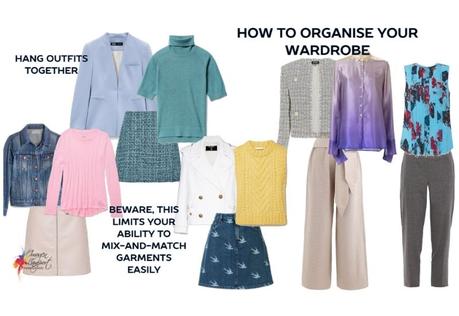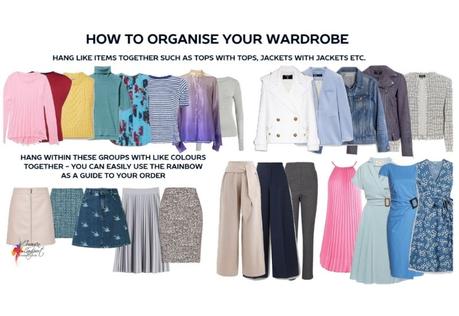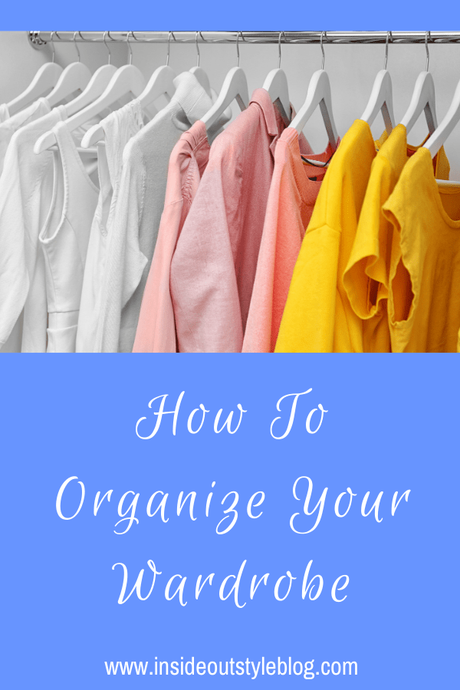



There are so many different ways to organize your wardrobe that there is no one right way. You need to consider what works for you and your organizational skills and preferences, including your space requirements. Do you prefer to have all your items visible and displayed or would you prefer a streamlined look, where items are hidden in drawers and behind closed doors?
Organizing by Outfits

Organizing by outfits is where you hang the whole outfit together, so they are ready to pull out the closet as a ready-to-wear outfit to save time each morning. This system is quick but it isn’t very versatile as it removes items out of rotation and you can’t wear those pieces in other outfits. When your closet is arranged by outfit it can be hard to mix-and-match what you already own and discover new ways to make your wardrobe work.
It’s important to take the time to organize your clothes into wearable outfits. You might stumble on combinations you didn’t think of before and turn your items into a new look. If you have large wardrobe where you can create several weeks of outfits without repeating any garments then spend a few hours one day trying on creating lots of different outfits and hanging them together to make it easier to dress and go.
I recommend photographing outfit combinations so you know exactly what goes together so if something changes, you can go through your album in the morning and pick a different outfit. I like to start with a hero piece – it could be a jacket or a patterned garment, then see just how many different ways I can style it with other existing pieces for different moods and occasions. I describe this in my free eBook 5 Step Formula for a Fabulous Wardrobe on a Budget – which if you haven’t got you can sign up for it and download here.
Even if you choose to organize your wardrobe differently, playing in your wardrobe; creating outfits and photographing them is a great idea. You can print them out or keep them as an album on your phone and arrange them by season.
If you don’t have the time or can’t be bothered to get in your wardrobe and create all the outfits first, then document your outfits each day with a simple outfit photo in the mirror. That small investment of time each day will make it faster and easier for you to get dressed stylishly every day without too much thought, especially when you are looking for an outfit and you’ve got limited time to think about what wear. Hate taking photos? Here are my tips on how to pose for photographs to help!
You may also want to start using a wardrobe app to help you remember what’s inside your wardrobe; get some tips on the different apps available here.
By playing in your wardrobe, you’ll also identify any wardrobe gaps needed to complete outfits.
Organize by Garment Type
 If you don’t want to hang your wardrobe by outfit then I would suggest you create sections in your wardrobe for different sorts of garments – tops, skirts, trousers etc.
If you don’t want to hang your wardrobe by outfit then I would suggest you create sections in your wardrobe for different sorts of garments – tops, skirts, trousers etc.
The final look of this type of organizing will depend on your wardrobe layout. A wardrobe with lots of cubby holes will be organized very differently to a wardrobe with one long hanging rail. Working in groups of items will help you figure out how much space you need and the best way to store each type of item.
Reserve the most accessible area of your wardrobe for clothes you wear most often. Out-of-season clothes, garments you only wear a few times a year, such as Halloween costumes and formal wear should be stored toward the back and on the upper shelves (or even under the bed if you have limited wardrobe space)
Within each section, I like to organize by colour making it easy to find specific garments. I start at white and work my way through to black via the rainbow (red / pink / orange / yellow / green / blue / violet / brown / grey / black). With patterns, put it into the colour section of the most dominant colour in the pattern. Ordering your clothes in type and colour is the easiest way to start to see more outfit options as you can take a coloured or patterned item and find all the other pieces that go with it easily.
I hang my necklaces by colour using lots of cup hooks so I can easily find ones that related to the colours I’m wearing. If it’s easy to find coordinated accessories and organize them, then you will take the time to wear them (or wear a greater range of them). Here are a few of the best storage ideas I’ve found for accessories.
I’m not the person to keep their shoes in their shoeboxes. I can’t be bothered placing the shoes back in their shoebox but I do have a shoe drawers from Ikea. I can lay my shoes out in an orderly fashion and it’s not difficult to put them away. If you have a lot of shoes in boxes, sticking a pictures of the shoes to the outside of the box will help you identify which shoes are in which box, saving you precious time.
If you want to see the inside of my wardrobe and how I organise you can check it out here.
What is important is that you figure out a way of storing your items so they are easy to access and that keeps them in some sort of order so it’s easier for you to get dressed.
Don’t Forget The Seasons
Here in Melbourne, we have four distinct seasons so I need to have more accessible storage for transeasonal weather garments that I can use to layer in my outfits. I can’t pack my winter wardrobe up and get the summer one out and vice versa as the seasons change. There are some items, like my heavy winter coats or summer dresses that I can put away or move to another cupboard but the transitional layers need to be accessible.
Remember, system that is easy for you to find garments or accessories is also a system that is more likely to get you to put things away quickly, rather than letting things pile up on your ‘floordrobe’ or allowing stuff to get shoved here, there and everywhere!
What does your wardrobe look like? Floordrobe? Jumble Sale? High-End Boutique? What would your dream wardrobe look like?
Further Reading
How to Create An Ordered Wardrobe (and why you want one)
Shop Your Wardrobe First
7 Popular Wardrobe and Outfit Planning Apps Reviewed
What Are the Patterns in Your Wardrobe?
Small Space, Big Style






